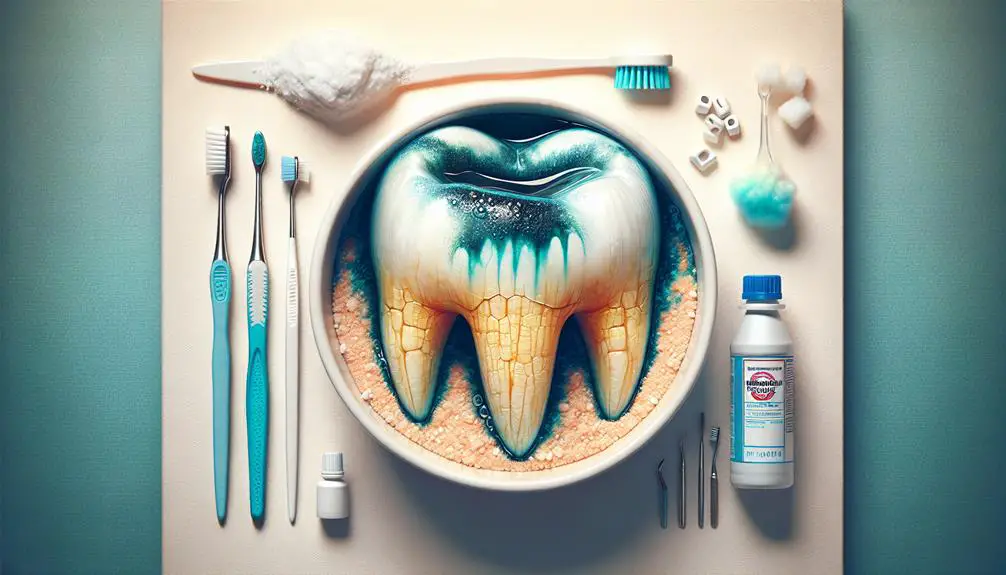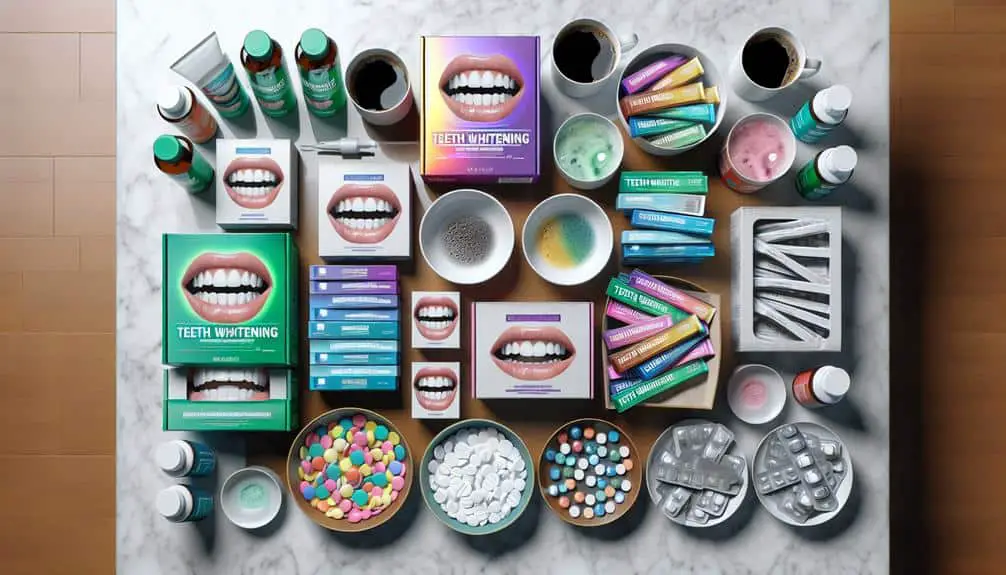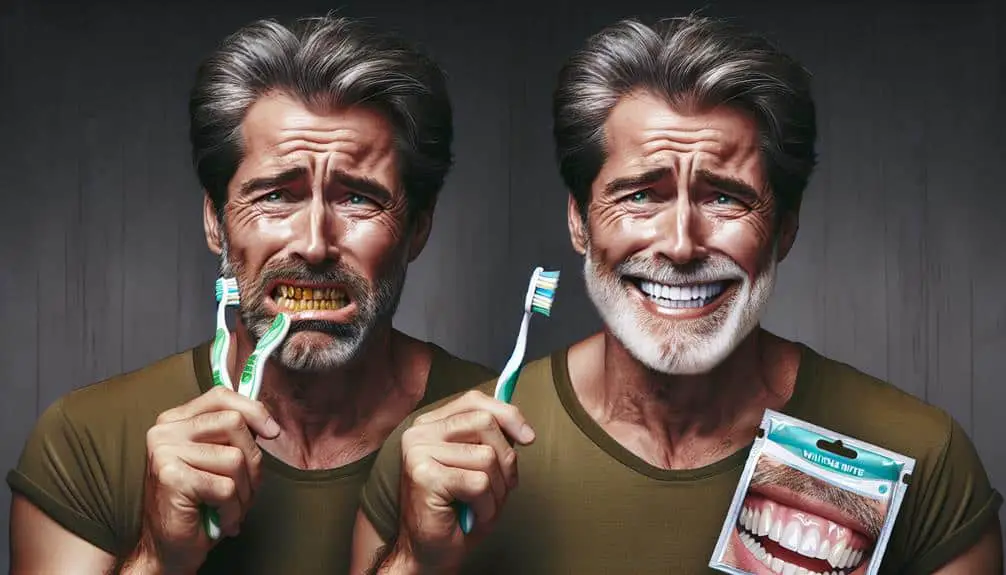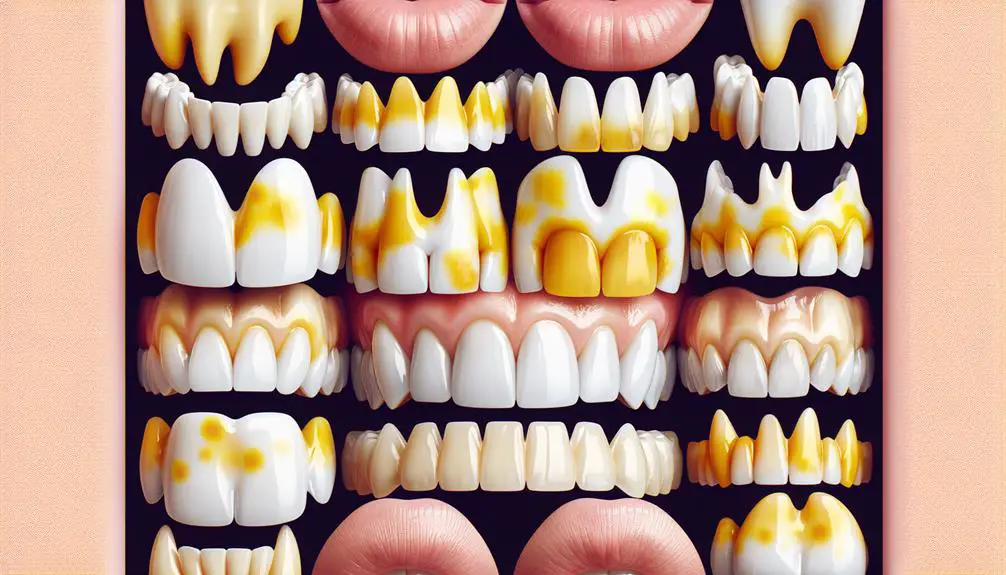To remove medication stains from enamel, start with proper brushing techniques. Use a soft toothbrush, brush for two minutes, and reach all surfaces. Try natural remedies like baking soda paste and oil pulling with coconut oil. Consider over-the-counter whitening products such as whitening strips or toothpaste. For more stubborn stains, seek professional dental treatments like laser removal or whitening procedures. Lifestyle changes like cutting down on staining foods and regular dental check-ups can prevent future stains. These methods can effectively help restore your enamel's brightness and health. Further information awaits on effective stain removal techniques.
Key Points
- Use whitening toothpaste with abrasives to gently remove medication stains.
- Consider professional whitening treatments for stubborn medication stains.
- Brush with baking soda and hydrogen peroxide paste for enamel stain removal.
- Consult a dentist for tailored advice on removing medication stains effectively.
- Avoid staining foods and beverages to prevent further enamel discoloration.
Brushing Techniques for Stain Removal
To effectively eliminate medication stains from enamel, consider incorporating specific brushing techniques into your dental care routine. Proper brushing is vital for stain prevention and maintaining enamel health. When brushing, use a soft-bristled toothbrush to avoid damaging the enamel while efficiently eliminating stains. Make sure you're brushing for a full two minutes each time, reaching all surfaces of your teeth, including the front, back, and chewing surfaces. Pay special attention to areas where stains tend to accumulate, such as near the gum line and between teeth.
In addition to using the right toothbrush and brushing for an adequate amount of time, the technique is essential. Hold your toothbrush at a 45-degree angle to your gums and use gentle, circular motions to clean the teeth thoroughly. Avoid brushing too hard, as this can wear down enamel and worsen staining issues. By following these proper brushing techniques consistently, you can effectively remove medication stains from enamel and prevent future staining, keeping your smile bright and healthy.
Natural Remedies for Enamel Stains
Consider trying natural remedies to tackle enamel stains effectively after implementing proper brushing techniques to maintain your dental health and combat medication stains.
Herbal remedies can be a gentle yet effective way to address enamel stains. For instance, using a mixture of sage and sea salt as a natural toothpaste can help remove surface stains without being abrasive on your enamel.
Additionally, DIY solutions like baking soda and hydrogen peroxide paste can act as a mild abrasive to eliminate stubborn stains. Another popular natural remedy is oil pulling with coconut oil, which is believed to reduce bacteria in the mouth and help whiten teeth.
In addition, incorporating fruits rich in malic acid, like strawberries, into your diet can aid in breaking down enamel stains. Remember to consult with your dentist before trying any natural remedy to ensure it's suitable for your specific dental needs.
Over-the-Counter Whitening Products
Exploring over-the-counter whitening products can provide a convenient and accessible solution for addressing enamel stains and enhancing your smile. Whitening strips are a popular choice among individuals looking to brighten their teeth at home. These strips are coated with a whitening gel containing hydrogen peroxide, which helps to remove surface stains on the enamel. When used as directed, whitening strips can effectively lighten the shade of your teeth, giving you a whiter and brighter smile.
In addition to whitening strips, there are toothpaste options specifically formulated to help combat enamel stains. Whitening toothpaste often contains abrasive particles or chemicals that work to gently polish away stains on the surface of the teeth. While these toothpaste options may not provide as dramatic results as professional treatments, they can help maintain a whiter smile when used consistently over time. When choosing a whitening toothpaste, look for one that's recognized by dental associations and has been proven to be effective in removing stains without causing damage to the enamel.
Professional Dental Treatments for Stains
When seeking more advanced solutions for stubborn enamel stains, professional dental treatments offer effective options to achieve a brighter and whiter smile.
Two common professional dental treatments for stains are laser treatment and whitening procedures. Laser treatment involves using a focused light beam to remove stains and discoloration from the enamel surface, resulting in a noticeable improvement in the overall whiteness of your teeth. This method is precise and can target specific areas with great accuracy.
Another option is whitening procedures performed by a dental professional. These treatments use stronger whitening agents than over-the-counter products, providing more significant results in a shorter amount of time. Your dentist can customize the whitening process to suit your specific needs and ensure optimal outcomes.
For more severe stains or intrinsic discoloration that can't be effectively treated with whitening alone, veneers or bonding may be recommended. Veneers are thin custom-made shells that cover the front surface of the teeth, while bonding involves applying a tooth-colored resin to improve the appearance of stained enamel. Consulting with a dental professional can help determine the most suitable treatment for your individual case.
Lifestyle Changes to Prevent Staining
To prevent staining on your enamel, implementing certain lifestyle changes can be highly effective in maintaining a brighter and healthier smile. Making small adjustments in your daily habits can go a long way in avoiding discoloration and preserving the whiteness of your teeth. Here are some key strategies to help you prevent medication stains on your enamel:
- Dietary adjustments: Cut down on foods and beverages known to cause staining, such as coffee, tea, red wine, and dark berries. Opt for a balanced diet rich in fruits and vegetables that promote oral health.
- Maintain good oral hygiene: Brush your teeth at least twice a day and floss regularly to prevent plaque buildup and surface stains.
- Lifestyle modifications: Quit smoking and avoid tobacco products, as they can lead to severe enamel discoloration over time.
- Regular dental check-ups: Schedule routine visits to your dentist for professional cleanings and to address any early signs of staining or discoloration.
Frequently Asked Questions
Can Medication Stains on Enamel Be Prevented in Any Way?
To prevent medication stains on enamel, consider using preventive measures like regular dental cleanings and avoiding staining substances. Natural remedies like baking soda and hydrogen peroxide can also help maintain enamel health and minimize discoloration.
Are There Any Specific Medications That Are Known to Cause More Staining on the Enamel?
When it comes to medications, some types are more likely to cause staining on enamel. Certain medications can lead to enamel discoloration over time. It's important to be aware of these effects for your oral health.
How Long Does It Typically Take for Medication Stains to Develop on Enamel?
Medication stains on enamel can develop over time due to various factors such as the composition of the medication and oral hygiene habits. The timeline for stain development varies, typically taking weeks to months.
Are There Any Specific Dietary Changes That Can Help Prevent Medication Stains on Enamel?
To prevent medication stains on enamel, consider dietary changes such as reducing acidic foods and beverages. Prevention strategies also include maintaining good oral hygiene practices, like regular brushing and visiting your dentist for professional cleanings.
Are There Any Alternative Treatments for Medication Stains on Enamel, Besides the Ones Mentioned in the Article?
When looking to address medication stains on enamel, you may explore natural remedies like baking soda and hydrogen peroxide for a gentle approach. For more stubborn stains, cosmetic dentistry procedures such as professional whitening could be considered.



